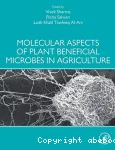| Titre : |
Molecular aspects of plant beneficial microbes in agriculture |
| Type de document : |
texte imprimé |
| Auteurs : |
Vivek Sharma ; Richa Salwan ; Laith Khalil Tawfeeq Al-Ani |
| Editeur : |
Elsevier |
| Année de publication : |
2020 |
| Autre Editeur : |
San Diego : Academic Press |
| Importance : |
xvi, 438 pages |
| Présentation : |
illustrations |
| Format : |
28 cm |
| ISBN/ISSN/EAN : |
978-0-12-818469-1 |
| Langues : |
Anglais (eng) |
| Index. décimale : |
571.2 Biologie végétale et des micro-organismes |
| Résumé : |
"Molecular Aspects of Plant Beneficial Microbes in Agriculture explores their diverse interactions, including the pathogenic and symbiotic relationship which leads to either a decrease or increase in crop productivity. Focusing on these environmentally-friendly approaches, the book explores their potential in changing climatic conditions. It presents the exploration and regulation of beneficial microbes in offering sustainable and alternative solutions to the use of chemicals in agriculture. The beneficial microbes presented here are capable of contributing to nutrient balance, growth regulators, suppressing pathogens, orchestrating immune response and improving crop performance.
The book also offers insights into the advancements in DNA technology and bioinformatic approaches which have provided in-depth knowledge about the molecular arsenal involved in mineral uptake, nitrogen fixation, growth promotion and biocontrol attributes." |
Molecular aspects of plant beneficial microbes in agriculture [texte imprimé] / Vivek Sharma ; Richa Salwan ; Laith Khalil Tawfeeq Al-Ani . - Elsevier : San Diego : Academic Press, 2020 . - xvi, 438 pages : illustrations ; 28 cm. ISBN : 978-0-12-818469-1 Langues : Anglais ( eng)
| Index. décimale : |
571.2 Biologie végétale et des micro-organismes |
| Résumé : |
"Molecular Aspects of Plant Beneficial Microbes in Agriculture explores their diverse interactions, including the pathogenic and symbiotic relationship which leads to either a decrease or increase in crop productivity. Focusing on these environmentally-friendly approaches, the book explores their potential in changing climatic conditions. It presents the exploration and regulation of beneficial microbes in offering sustainable and alternative solutions to the use of chemicals in agriculture. The beneficial microbes presented here are capable of contributing to nutrient balance, growth regulators, suppressing pathogens, orchestrating immune response and improving crop performance.
The book also offers insights into the advancements in DNA technology and bioinformatic approaches which have provided in-depth knowledge about the molecular arsenal involved in mineral uptake, nitrogen fixation, growth promotion and biocontrol attributes." |
|  |


